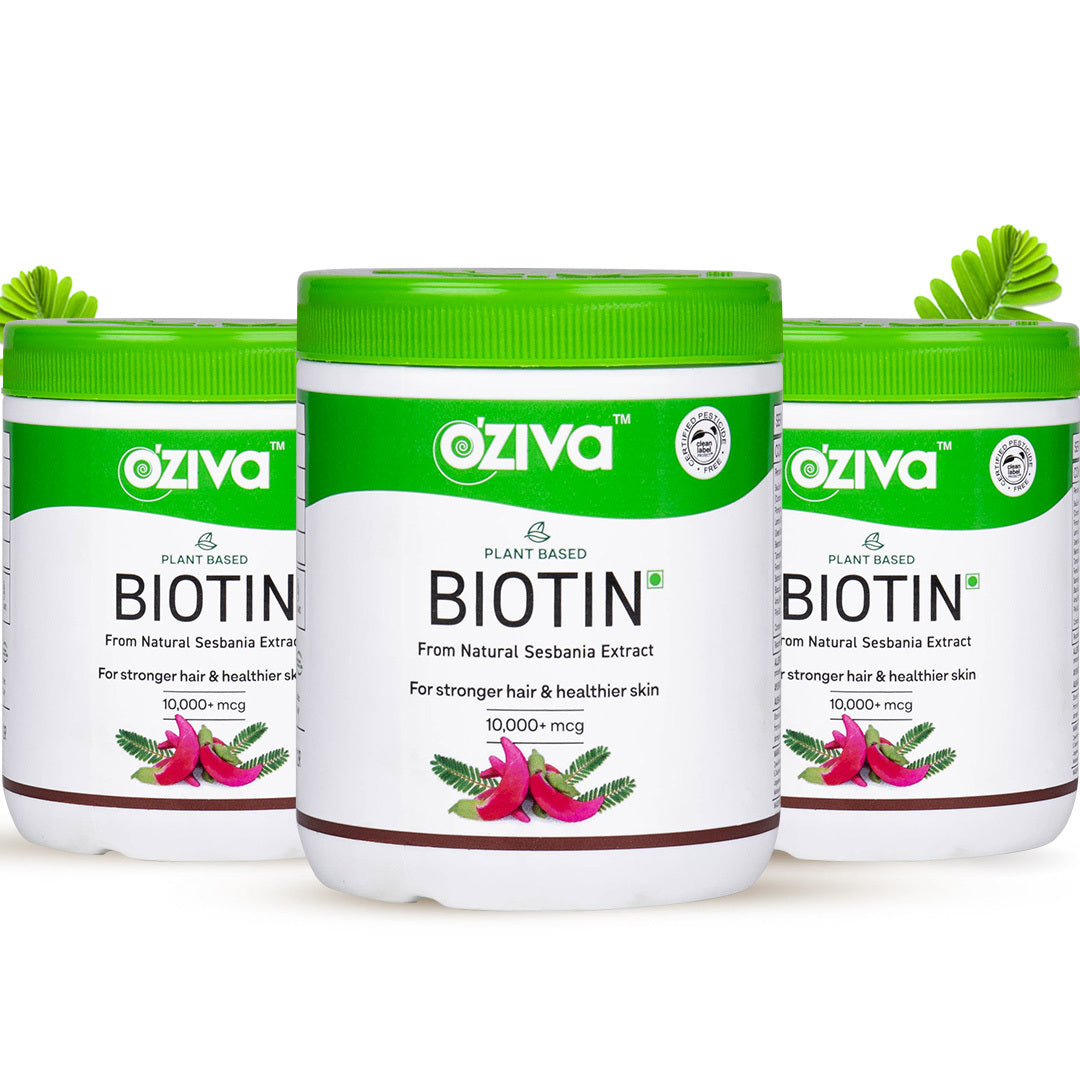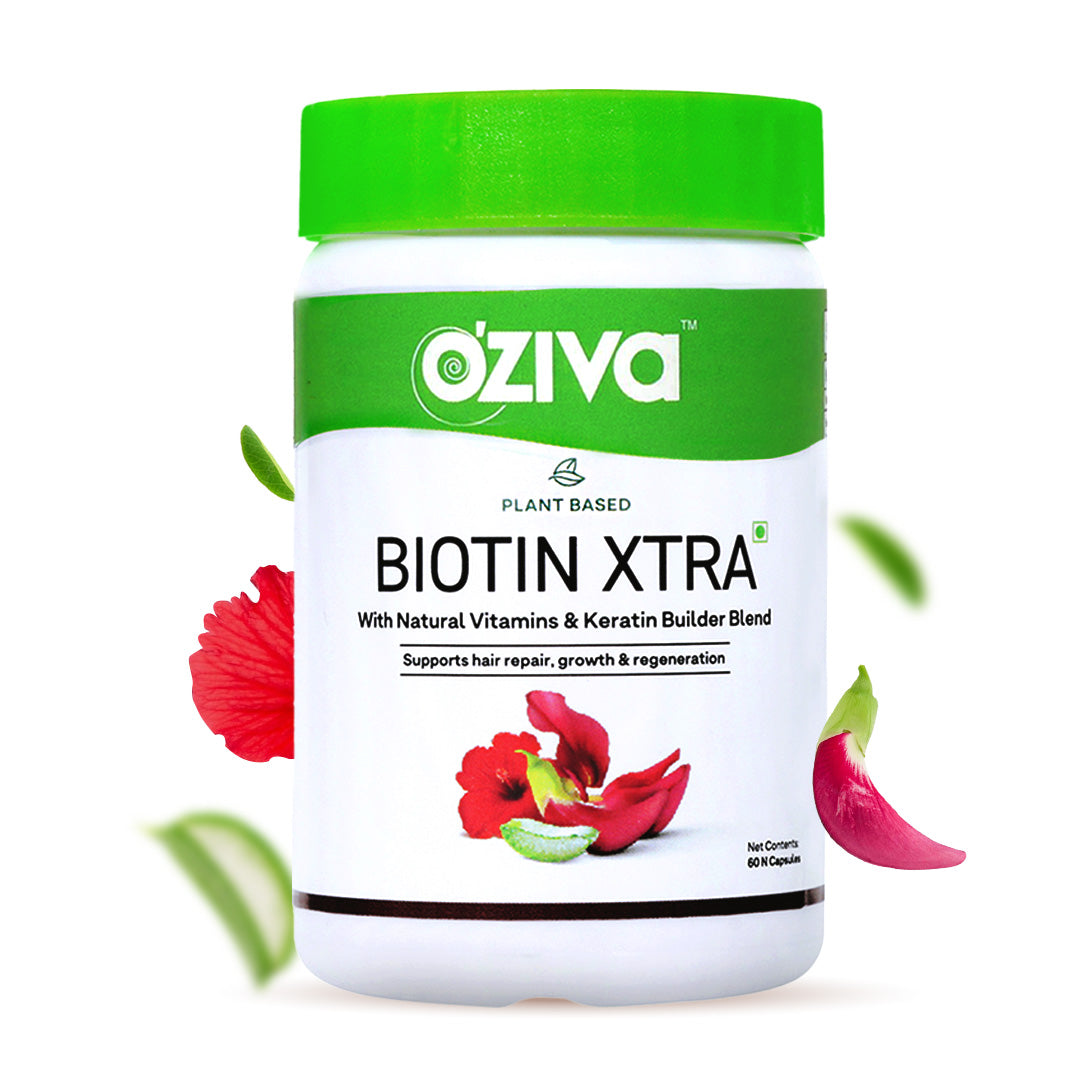Clean and Plant Based
Enriched with Ayurveda
Personalized Guidance
Biotin: The Essential Vitamin for Hair, Skin, and Beyond
Biotin, also known as vitamin H or B7, is a water-soluble B-complex vitamin that plays a crucial role in various bodily functions. It is often associated with promoting healthy hair, skin, and nails, but its significance goes far beyond aesthetics. In this comprehensive guide, we will explore the many facets of biotin, from its functions in the body to its dietary sources, recommended intake, potential benefits, and possible side effects.
The Role of Biotin in the Body
Biotin is a coenzyme that participates in several essential metabolic processes in the body. It primarily serves as a cofactor for enzymes involved in the breakdown of carbohydrates, fats, and proteins. Here are some key functions of biotin:
- Energy Production: Biotin is involved in the metabolism of macronutrients (carbohydrates, fats, and proteins) into energy. It helps convert glucose from carbohydrates into usable energy for the body's cells.
- Healthy Skin: Biotin is crucial for maintaining healthy skin, as it supports the production of fatty acids, which are essential for skin health. It also plays a role in skin repair and regeneration.
- Hair and Nail Health: Biotin is often associated with promoting strong and healthy hair and nails. It contributes to the formation of keratin, a protein that makes up the structure of hair and nails. As a result, with Biotin you can get increased hair density, hair growth and shinier hair, as well as improved nail health that are stronger and less brittle!
Dietary Sources of Biotin
Biotin is considered an essential nutrient, which means that the body cannot produce it in sufficient quantities, and it must be obtained through the diet. Fortunately, biotin is found in a wide range of foods. Some of the best dietary sources of biotin include:
- Nuts and Seeds: Almonds, peanuts, sunflower seeds, and walnuts are rich in biotin. Snacking on these nuts and seeds can contribute to your daily intake.
- Legumes: Beans, lentils, and soybeans contain biotin and can be included in a variety of dishes.
- Whole Grains: Whole grains like oats, barley, and brown rice contain moderate amounts of biotin.
- Fruits and Vegetables: Avocado, sweet potatoes, and cauliflower are among the fruits and vegetables that contain biotin.
Recommended Daily Intake of Biotin
The recommended daily intake of biotin varies depending on age, sex, and life stage. The Adequate Intake (AI) levels set by the Institute of Medicine in the United States are as follows:
Infants:
0-6 months: 5 micrograms (mcg) per day
7-12 months: 6 mcg per day
Children:
1-3 years: 8 mcg per day
4-8 years: 12 mcg per day
9-13 years: 20 mcg per day
Adolescents and Adults:
14-18 years: 25 mcg per day
19 years and older: 30 mcg per day
Pregnancy: 30 mcg per day
Lactation: 35 mcg per day
It's important to note that these recommendations are based on the prevention of deficiency rather than optimizing health. Some individuals may require higher amounts of biotin, especially if they are pregnant, breastfeeding, have specific medical conditions, or are taking medications that interfere with biotin absorption.
Also important to note is that Biotin is a water-soluble vitamin. That means it gets flushed out of your body through sweat or urine, and it does not stay for long. Amounts above the recommended are also safe to consume long term, such as 5000 mcg or 10000 mcg+ of Biotin, which are optimum doses for hair growth!
Biotin Supplements: Benefits and Considerations
Biotin supplements are readily available over-the-counter in various forms, including capsules, tablets, and soft gels. These supplements are often marketed for their potential benefits in enhancing hair, skin, and nail health. While biotin supplementation can be beneficial in certain situations, it's essential to understand its potential advantages and considerations.
Potential Benefits of Biotin Supplements:
- Improved Hair Health: Biotin supplements are commonly taken to promote hair growth and reduce hair loss. Some individuals with biotin deficiency may experience hair thinning or brittle hair, and supplementation can help address these issues.
- Stronger Nails: Biotin is believed to strengthen nails and reduce nail brittleness. This benefit is often sought by individuals with weak or splitting nails.
- Enhanced Skin Health: Biotin can contribute to healthy skin by promoting the production of fatty acids and supporting overall skin function.
Considerations and Potential Side Effects of Biotin:
While biotin supplements are generally considered safe when taken within recommended dosages, there are some considerations to keep in mind:
- Interference with Lab Tests: Biotin supplements can interfere with certain lab tests, including thyroid function tests and hormone assays. This interference can lead to inaccurate results. If you are taking biotin supplements and need to undergo lab tests, inform your healthcare provider.
- Allergic Reactions: Although rare, some individuals may experience allergic reactions to biotin supplements, leading to symptoms such as hives, itching, and difficulty breathing. If you experience severe allergic reactions, seek medical attention immediately.
- Digestive Upset: High doses of biotin supplements may cause digestive upset, including nausea and diarrhea. It's essential to follow the recommended dosage guidelines.
- Risk of Overdose: Biotin is a water-soluble vitamin, which means that excess amounts are excreted in urine. However, taking extremely high doses of biotin supplements is not recommended, as it may lead to imbalances in other B vitamins.
Biotin Supplements for Hair Growth: Separating Fact from Fiction
One of the most popular uses of biotin supplements is for hair growth and the prevention of hair loss. The idea that biotin can improve hair health has gained widespread attention, and many hair care products now contain biotin as a key ingredient. However, it's important to distinguish between fact and fiction when it comes to biotin's role in hair growth.
The Facts:
Biotin Deficiency and Hair Loss: Hair loss can occur in individuals with biotin deficiency. In such cases, biotin supplementation may lead to improvements in hair growth and thickness.
Healthy Hair Maintenance: Biotin is essential for maintaining the health of existing hair. It contributes to the production of keratin, a protein that forms the structural basis of hair.
Individual Variability: The impact of biotin on hair health can vary from person to person. Some individuals may experience noticeable improvements in hair quality and growth, while others may not see significant changes.
The Fiction:
Miraculous Hair Growth: Biotin is not a miracle cure for hair loss or a guaranteed way to achieve Rapunzel-like locks. Hair growth is influenced by multiple factors, including genetics, overall health, and hormonal balance.
Excessive Dosages: Taking excessive doses of biotin supplements in the hope of accelerating hair growth is not recommended. High doses are unlikely to produce better results and may lead to side effects.
Quick Fixes: Hair growth is a gradual process, and results from biotin supplementation, if any, may take several months to become noticeable.
Addressing Underlying Causes: Hair loss can result from various underlying factors, including genetics, hormonal imbalances, and medical conditions. Biotin may be most effective for individuals with hair loss related to biotin deficiency, so it's essential to identify and address the specific cause of hair loss.
Biotin and Nail Health
In addition to its potential benefits for hair health, biotin is often associated with promoting stronger and healthier nails. Similar to its role in hair health, biotin contributes to the production of keratin, which is a key structural component of nails. However, the evidence supporting the use of biotin supplements for nail health is mixed.
The Potential Benefits of Biotin for Nails:
Reduced Nail Brittleness: Biotin supplements may help reduce nail brittleness and improve overall nail quality in some individuals.
Strengthening of Nails: Biotin is believed to strengthen nails, potentially making them less prone to splitting and breaking.
Improved Nail Thickness: Some people may experience an increase in nail thickness with biotin supplementation.
Considerations for Nail Health:
Individual Variation: As with hair health, the response to biotin supplements for nail health can vary from person to person. While some individuals may notice improvements, others may not experience significant changes.
Time Frame: Biotin's effects on nail health, if any, may take several months to become apparent. Consistent use is key.
Underlying Factors: Nail problems can result from various underlying factors, including nutritional deficiencies, fungal infections, and trauma. Biotin supplements are more likely to benefit individuals with nail issues related to biotin deficiency.
Biotin and Skin Health
Biotin is essential for maintaining healthy skin, and its role in skin health is well-established. Here are some ways in which biotin contributes to skin health:
Fatty Acid Production: Biotin supports the synthesis of fatty acids, which are essential for maintaining skin integrity and moisture.
Skin Repair: Biotin plays a role in skin repair and regeneration, helping the skin recover from damage.
Moisture Retention: Adequate biotin levels can contribute to improved skin moisture retention, leading to a healthier and more vibrant complexion.
Inflammation Reduction: Some studies suggest that biotin may have anti-inflammatory properties, which can help reduce skin redness and irritation.
Acne Management: Biotin supplements have been associated with acne breakouts in some individuals. While this is not common, individuals with a history of acne should monitor their skin when taking biotin supplements.
It's important to note that while biotin can support healthy skin, it is not a substitute for a comprehensive skincare routine that includes cleansing, moisturizing, sun protection, and other skincare practices.
Biotin and Metabolic Health
Biotin's role in metabolism extends beyond its influence on hair, skin, and nails. It plays a significant role in glucose metabolism, fatty acid synthesis, and the utilization of amino acids. Here are some ways in which biotin can impact metabolic health:
Blood Sugar Regulation: Biotin is involved in the metabolism of glucose (sugar). It helps improve insulin sensitivity, which can contribute to better blood sugar control.
Support for Weight Management: Some research suggests that biotin may aid in weight management by enhancing the body's ability to use glucose efficiently and promote fat metabolism.
Energy Production: Biotin assists in the conversion of carbohydrates, fats, and proteins into energy, which is essential for overall metabolic function.
Lipid Metabolism: Biotin plays a role in the synthesis of fatty acids, which are building blocks of lipids (fats). Proper lipid metabolism is crucial for maintaining cardiovascular health.
Amino Acid Metabolism: Biotin is involved in the metabolism of amino acids, the building blocks of proteins. This ensures that proteins are properly utilized by the body.
It's important to emphasize that while biotin can support metabolic health, it should not be viewed as a standalone solution for weight management or blood sugar control. A healthy diet, regular physical activity, and other lifestyle factors are equally important.
- Choosing a selection results in a full page refresh.
- Press the space key then arrow keys to make a selection.




